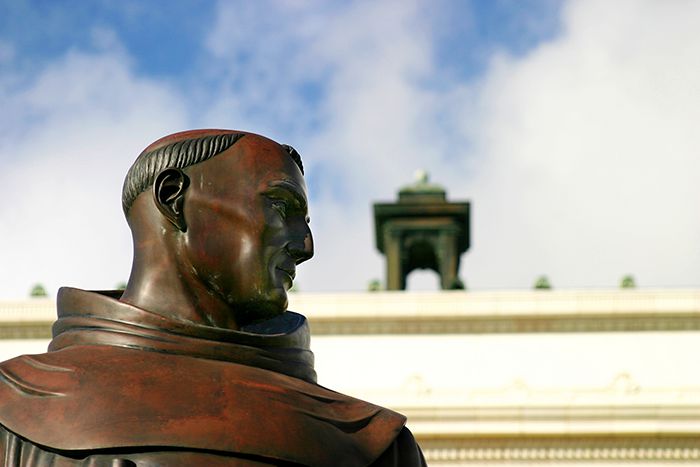The Catholic bishops of California issued a statement June 22 defending St. Junipero Serra’s legacy as a defender of Native Americans after statues of the saint were toppled in San Francisco and Los Angeles over the weekend.
Serra “was not simply a man of his times,” the bishops said, but “a man ahead of his times who made great sacrifices to defend and serve the indigenous population and work against an oppression that extends far beyond the mission era.”
“The historical truth is that Serra repeatedly pressed the Spanish authorities for better treatment of the Native American communities,” said the statement released by the California Catholic Conference (CCC) Monday afternoon.
A statue of Serra was torn down in San Francisco’s Golden Gate Park June 20, along with statues of Francis Scott Key and Ulysses S. Grant. A few hours later, rioters pulled down a statue of Serra in downtown Los Angeles.
In their statement, the bishops praised the “movement to confront racism within our society during these past weeks” for providing “bold new hope for every American that our nation can begin to transform key elements of our racist past and present.”
While they affirmed that they “vigorously and wholeheartedly support” efforts to identify, and repair historical instances of racism against members of the African-American and Native American communities, the bishops said that on the specific question of removing statues and other public images, the actual history of the individuals must be considered.
“If this process is to be truly effective as a remedy for racism, it must discern carefully the entire contribution that the historical figure in question made to American life, especially in advancing the rights of marginalized peoples,” they said.
“In calling for the removal of images of Saint Junipero Serra from public display in California, and in tearing down his statue in San Francisco and in Los Angeles, protesters have failed that test.”
Serra, who was canonized a saint by Pope Francis in 2015, was an eighteenth century Franciscan missionary who founded nine Catholic missions in the area that would later become California; many of those missions would go on to become the centers of major California cities.
The saint helped to convert thousands of native Californians to Christianity and taught them new agricultural technologies.
Some California activists view Serra, an 18th-century Franciscan missionary, as having contributed to the destruction of Native American way of life through his founding of the first nine of California’s mission churches. Many of the priest’s biographers dispute those claims.
The bishops said if Serra’s sacrifices to defend the rights of Native Americans “is not enough to legitimate a public statue in the state that he did so much to create, then virtually every historical figure from our nation's past will have to be removed for their failings measured in the light of today's standards.”
On Saturday, Archbishop Cordileone said that Serra made “heroic sacrifices to protect the indigenous people of California from their Spanish conquerors, especially the soldiers,” recalling how Serra, despite having an infirm leg, walked to Mexico City to obtain special authority from the Spanish viceroy to discipline the military who were abusing the indigenous people.
“Then he walked back to California,” the archbishop said.
Cordileone said that it is important not to “deny that historical wrongs have occurred, even by people of good will, and healing of memories and reparation is much needed. But just as historical wrongs cannot be righted by keeping them hidden, neither can they be righted by rewriting the history.”
Catholic News Agency contributed to this report.

